It’s the spook-spookiest time of the year! Celebrate all-things Halloween literary style with these thirteen creepy poems!
1. “The Rime of the Ancient Mariner” by Samuel Taylor Coleridge
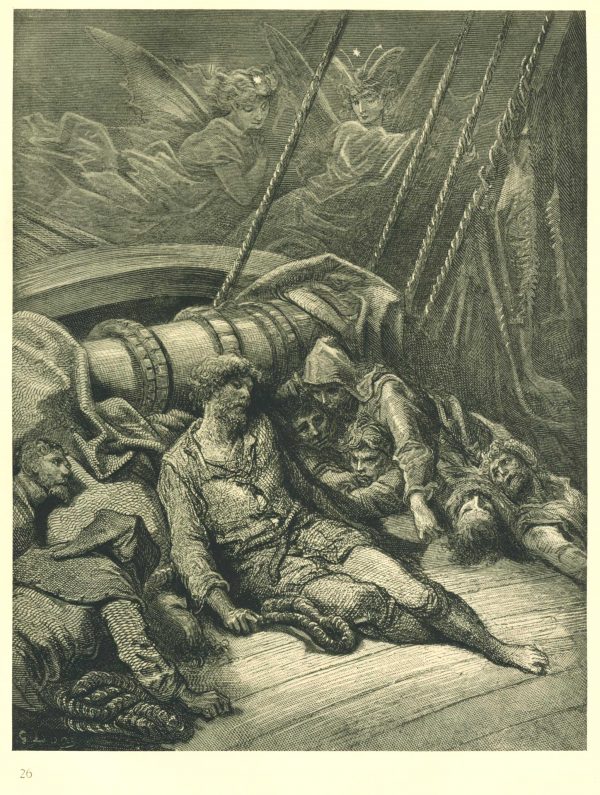
Source: Flavorwire
2. “I Felt A Funeral, In My Brain” by Emily Dickinson
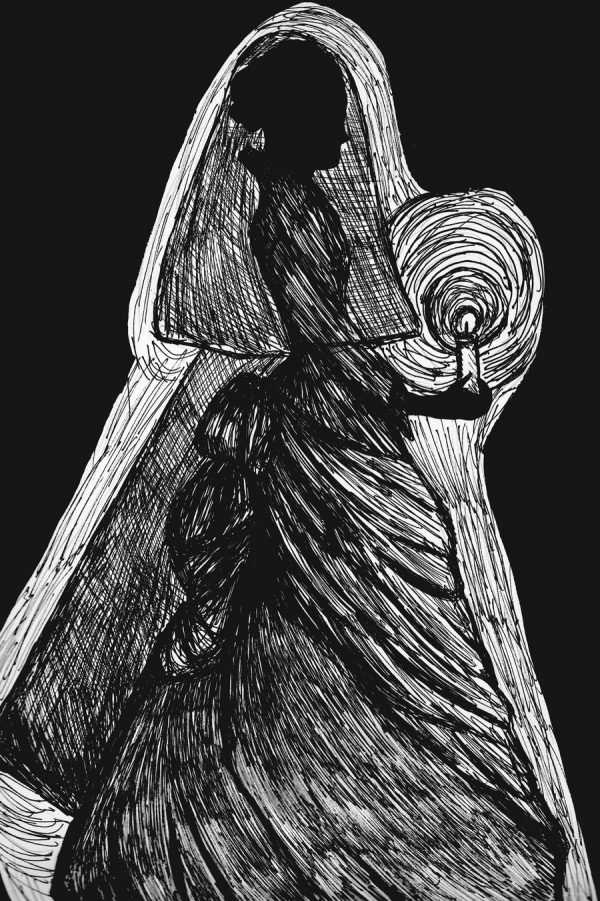
Source: DeviantArt
3. “The Hollow Men” by T.S. Eliot
“The Hollow Men” by T. S. Eliot is probably most well-known for its last four lines:
“This is the way the world ends
This is the way the world ends
This is the way the world ends
Not with a bang but a whimper.”
The poem itself is haunting, dealing with post-World War I Europe, the difficulty of hope and religious conversion and even Eliot’s own failed marriage. “The Hollow Men” follows the otherworldly journey of the spiritually dead, realizing their guilt and status as lost, broken souls. These first few lines illustrate how beautifully dark this poem gets:
“We are the hollow men
We are the stuffed men
Leaning together
Headpiece filled with straw. Alas!
Our dried voices, when
We whisper together
Are quiet and meaningless
As wind in dry grass
Or rats’ feet over broken glass
In our dry cellar
Shape without form, shade without colour,
Paralysed force, gesture without motion;
Those who have crossed
With direct eyes, to death’s other Kingdom
Remember us—if at all—not as lost
Violent souls, but only
As the hollow men
The stuffed men.”
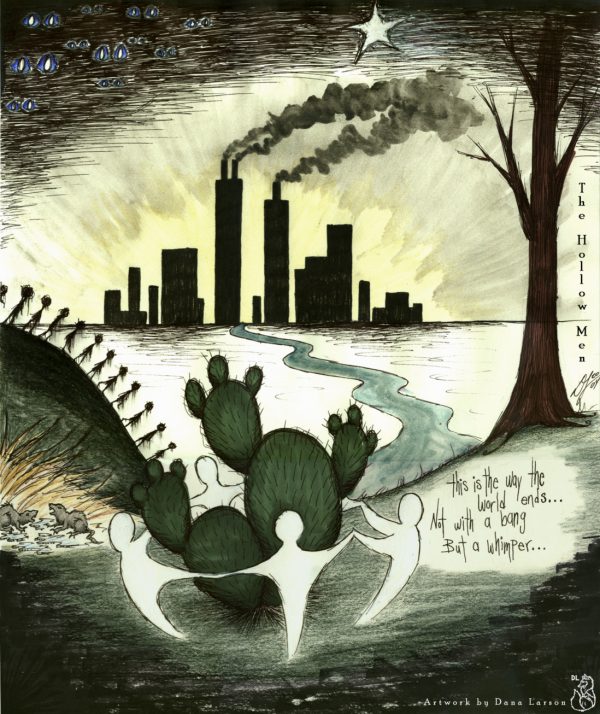
Source: Dana Larson
4. “Her Strong Enchantments Failing” by A.E. Housman
Most of A.E. Housman’s, a classical scholar and emotionally withdrawn man, lyrical poems evoked dooms and disappointments of youth in the English countryside. “Her Strong Enchantments Failing” definitely falls into that “doom” category—make sure to read the entirety of the poem (it’s a short one!) to get the most impact from the chilling final line:
“Her strong enchantments failing,
Her towers of fear in wreck,
Her limbecks dried of poisons
And the knife at her neck,
The Queen of air and darkness
Begins to shrill and cry,
“O young man, O my slayer,
To-morrow you shall die.”
O Queen of air and darkness,
I think ’tis truth you say,
And I shall die tomorrow;
But you will die to-day.”

Source: Ancient Origins
5. “Dead Man’s Hate” by Robert Ervin Howard
Robert Ervin Howard is best known for his career writing pulp novels, creating the character of Conan the Barbarian, and is widely regarded as the father of the sword and sorcery sub-genre. Howard often wrote tales of monsters, which was true even in his poetry:
“They hanged John Farrel in the dawn amid the marketplace;
At dusk came Adam Brand to him and spat upon his face.
“Ho neighbors all,” spake Adam Brand, “see ye John Farrel’s fate!
“Tis proven here a hempen noose is stronger than man’s hate!
For heard ye not John Farrel’s vow to be avenged upon me
Come life or death? See how he hangs high on the gallows tree!”
Yet never a word the people spoke, in fear and wild surprise-
For the grisly corpse raised up its head and stared with sightless eyes,
And with strange motions, slow and stiff, pointed at Adam Brand
And clambered down the gibbet tree, the noose within its hand.
With gaping mouth stood Adam Brand like a statue carved of stone,
Till the dead man laid a clammy hand hard on his shoulder bone.
Then Adam shrieked like a soul in hell; the red blood left his face
And he reeled away in a drunken run through the screaming market place;
And close behind, the dead man came with a face like a mummy’s mask,
And the dead joints cracked and the stiff legs creaked with their unwonted task.
Men fled before the flying twain or shrank with bated breath,
And they saw on the face of Adam Brand the seal set there by death.
He reeled on buckling legs that failed, yet on and on he fled;
So through the shuddering market-place, the dying fled the dead.
At the riverside fell Adam Brand with a scream that rent the skies;
Across him fell John Farrel’s corpse, nor ever the twain did rise.
There was no wound on Adam Brand but his brow was cold and damp,
For the fear of death had blown out his life as a witch blows out a lamp.
His lips were writhed in a horrid grin like a fiend’s on Satan’s coals,
And the men that looked on his face that day, his stare still haunts their souls.
Such was the fate of Adam Brand, a strange, unearthly fate;
For stronger than death or hempen noose are the fires of a dead man’s hate.”

Source: YouTube
6. “La Belle Dame Sans Merci” by John Keats
“La Belle Dame sans Merci” (French for “The Beautiful Lady Without Mercy”) is a story of love and death set in a bleak winter landscape. The beautiful lady titles the poem is a femme fatale who attracts lovers only to destroy them by her supernatural powers. This poem will have you questioning if the man in the poem has been abducted by a fairy-lover, or if the fairy / beautiful lady has actually abducted the man—and just what kind of kinky stuff is happening between them? Read on for Keats at his wildest and creepiest:
“O what can ail thee, knight-at-arms,
Alone and palely loitering?
The sedge has withered from the lake,
And no birds sing.
O what can ail thee, knight-at-arms,
So haggard and so woe-begone?
The squirrel’s granary is full,
And the harvest’s done.
I see a lily on thy brow,
With anguish moist and fever-dew,
And on thy cheeks a fading rose
Fast withereth too.
I met a lady in the meads,
Full beautiful—a faery’s child,
Her hair was long, her foot was light,
And her eyes were wild.
I made a garland for her head,
And bracelets too, and fragrant zone;
She looked at me as she did love,
And made sweet moan
I set her on my pacing steed,
And nothing else saw all day long,
For sidelong would she bend, and sing
A faery’s song.
She found me roots of relish sweet,
And honey wild, and manna-dew,
And sure in language strange she said—
‘I love thee true’.
She took me to her Elfin grot,
And there she wept and sighed full sore,
And there I shut her wild wild eyes
With kisses four.
And there she lullèd me asleep,
And there I dreamed—Ah! woe betide!—
The latest dream I ever dreamt
On the cold hill side.
I saw pale kings and princes too,
Pale warriors, death-pale were they all;
They cried—‘La Belle Dame sans Merci
Hath thee in thrall!’
I saw their starved lips in the gloam,
With horrid warning gapèd wide,
And I awoke and found me here,
On the cold hill’s side.
And this is why I sojourn here,
Alone and palely loitering,
Though the sedge is withered from the lake,
And no birds sing.”
7. “Outcast” by Claude McKay
In this poem by Claude McKay, the horrors are not supernatural, but instead all to painfully real, even today. “Outcast” details what it’s like to be black in a deeply racist world:
“For the dim regions whence my fathers came
My spirit, bondaged by the body, longs.
Words felt, but never heard, my lips would frame;
My soul would sing forgotten jungle songs.
I would go back to darkness and to peace,
But the great western world holds me in fee,
And I may never hope for full release
While to its alien gods I bend my knee.
Something in me is lost, forever lost,
Some vital thing has gone out of my heart,
And I must walk the way of life a ghost
Among the sons of earth, a thing apart;
For I was born, far from my native clime,
Under the white man’s menace, out of time.”

Source: Commonwheal
8. “Mad Girl’s Love Song” by Sylvia Plath
In keeping with the real-life horrors theme, Sylvia Plath’s battle with mental illness has been well-documented. “Mad Girl’s Love Song” gives an intimate look at mental illness, hallucinations and young love, along with a cameo from seraphim and Satan’s henchmen. Let this one sink in as you take your time to read it:
“I shut my eyes and all the world drops dead;
I lift my lids and all is born again.
(I think I made you up inside my head.)
The stars go waltzing out in blue and red,
And arbitrary blackness gallops in:
I shut my eyes and all the world drops dead.
I dreamed that you bewitched me into bed
And sung me moon-struck, kissed me quite insane.
(I think I made you up inside my head.)
God topples from the sky, hell’s fires fade:
Exit seraphim and Satan’s men:
I shut my eyes and all the world drops dead.
I fancied you’d return the way you said,
But I grow old and I forget your name.
(I think I made you up inside my head.)
I should have loved a thunderbird instead;
At least when spring comes they roar back again.
I shut my eyes and all the world drops dead.
(I think I made you up inside my head.)”
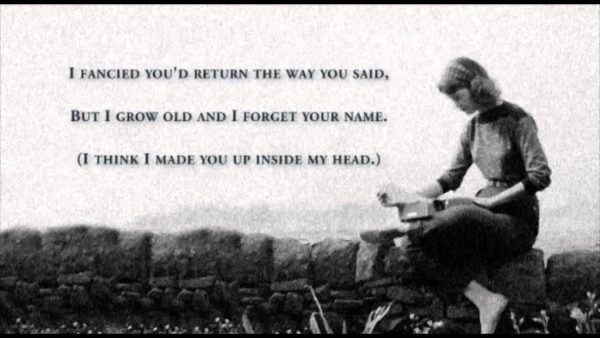
Source: YouTube
9. “Ulalume” by Edgar Allan Poe
It wouldn’t be Halloween without some mention of Edgar Allen Poe! Much like a few of Poe’s other poems (such as “The Raven,” “Annabel Lee,” and “Lenore”), “Ulalume” focuses on the narrator’s loss of a beautiful woman due to her untimely death. Perfect for Halloween, this poem takes place on a night in the “lonesome October” with a gray sky as the leaves are withering for the autumn season. Here are a few of the more chilling selections:
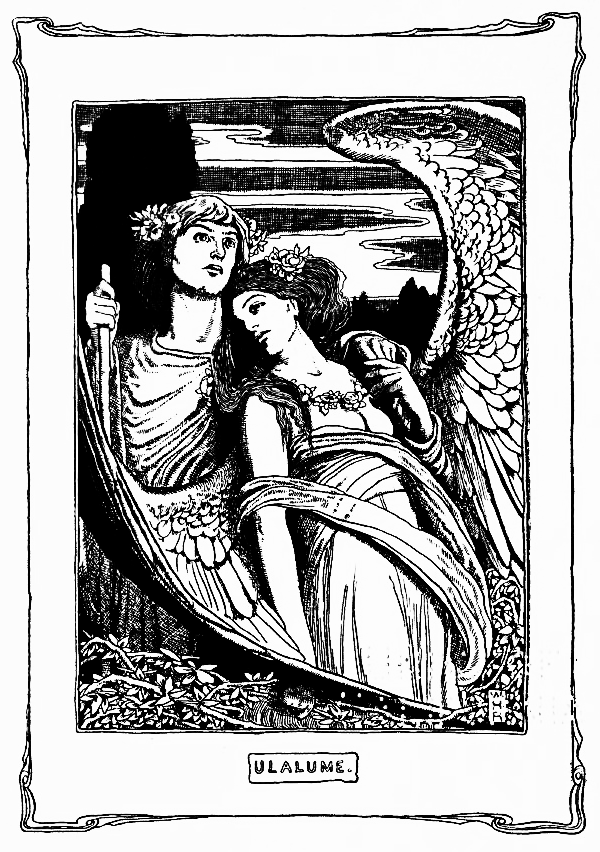
Source: Adelaide.edu
10. “Goblin Market” by Christina Rossetti
In this slightly-NSFW narrative poem by Christina Rossetti (which was illustrated by her brother, the Pre-Raphaelite artist Dante Gabriel Rossetti), two close sisters, Laura and Lizzie, make a strange deal with a group of goblin merchants. This long poem packs a wallop of creepiness, including grotesque goblin imagery, incestuous homo-eroticism and a horrifying forcible fruit-eating scene. Some of the more creepier passages are included below:
(…)
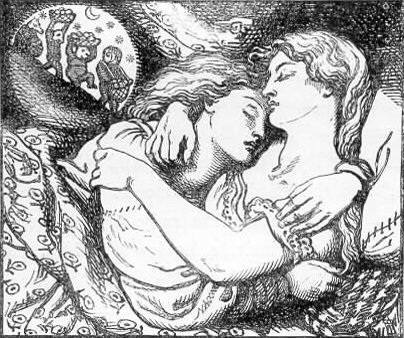
Source: Wikimedia Commons
11. “Love in the Asylum” by Dylan Thomas
“Love In The Asylum” by Dylan Thomas can serve as a sort of companion piece to the Plath poem, including similar hallucinations of frantic love. Plus, it all takes place in an asylum, just to up the creepy factor!
“A stranger has come
To share my room in the house not right in the head,
A girl mad as birds
Bolting the night of the door with her arm her plume.
Strait in the mazed bed
She deludes the heaven-proof house with entering clouds
Yet she deludes with walking the nightmarish room,
At large as the dead,
Or rides the imagined oceans of the male wards.
She has come possessed
Who admits the delusive light through the bouncing wall,
Possessed by the skies
She sleeps in the narrow trough yet she walks the dust
Yet raves at her will
On the madhouse boards worn thin by my walking tears.
And taken by light in her arms at long and dear last
I may without fail
Suffer the first vision that set fire to the stars.”\
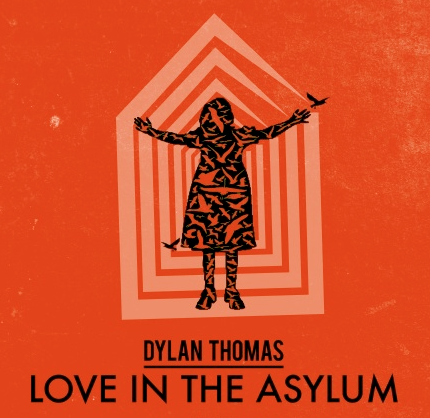
Source: Beaming Notes
12. “Reapers” by Jean Toomer
This short poem doesn’t need many stanzas to achieve its frightening effect. may at first glance seem innocuous, but it is actually a rather foreboding poem that is not only eerie, but also contains a lot of symbolism about race and violence in American society.
Blood-stained, continue cutting weeds and shade.

Source: Van Gogh Gallery
13. “The Stolen Child” by W.B. Yeats
“The Stolen Child” by W.B. Yeats is a poem based on Irish legend about faeries beguiling a child to come away with them. But it’s not just the kidnapping and implied murder of a child that makes this poem so creepy… it’s how tempting Yeats makes going off to fairyland sound!
“Where dips the rocky highland
Of Sleuth Wood in the lake,
There lies a leafy island
Where flapping herons wake
The drowsy water-rats.
There we’ve hid our fairy vats
Full of berries,
And of reddest stolen cherries.
Come away, O, human child!
To the woods and waters wild
With a fairy hand in hand,
For the world’s more full of weeping than
you can understand.
Where the wave of moonlight glosses
The dim grey sands with light,
Far off by farthest Rosses
We foot it all the night,
Weaving olden dances,
Mingling hands, and mingling glances,
Till the moon has taken flight;
To and fro we leap,
And chase the frothy bubbles,
While the world is full of troubles
And is anxious in its sleep.
Come away! O, human child!
To the woods and waters wild,
With a fairy hand in hand,
For the world’s more full of weeping than
you can understand.
Where the wandering water gushes
From the hills above Glen-Car,
In pools among the rushes,
That scarce could bathe a star,
We seek for slumbering trout,
And whispering in their ears;
We give them evil dreams,
Leaning softly out
From ferns that drop their tears
Of dew on the young streams.
Come! O, human child!
To the woods and waters wild,
With a fairy hand in hand,
For the world’s more full of weeping then
you can understand.
Away with us, he’s going,
The solemn-eyed;
He’ll hear no more the lowing
Of the calves on the warm hill-side.
Or the kettle on the hob
Sing peace into his breast;
Or see the brown mice bob
Round and round the oatmeal chest.
For he comes, the human child,
To the woods and waters wild,
With a fairy hand in hand,
For the world’s more full of weeping than
he can understand.”

Source: Bibliophilia Obscura
I don’t know about you, but I have chills! Bust out any of these creeptastic, eerie poems at your Halloween get-together and it’s sure to be a hit! Sweet dreams!
YouTube Channel: agelesspoetry
Featured Image via Pixabay
h/t Bustle and Flavorwire




